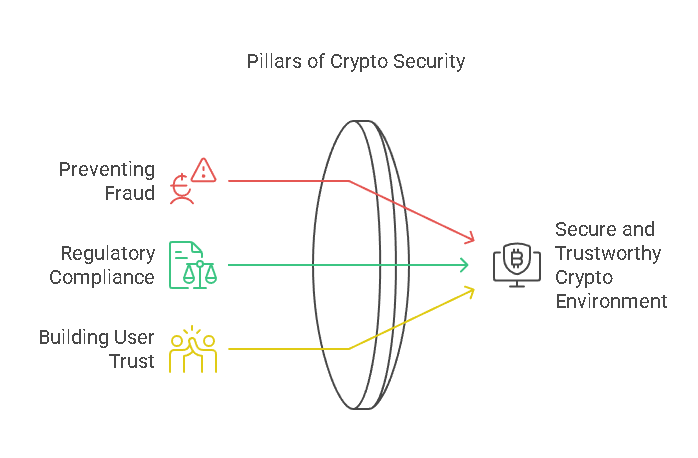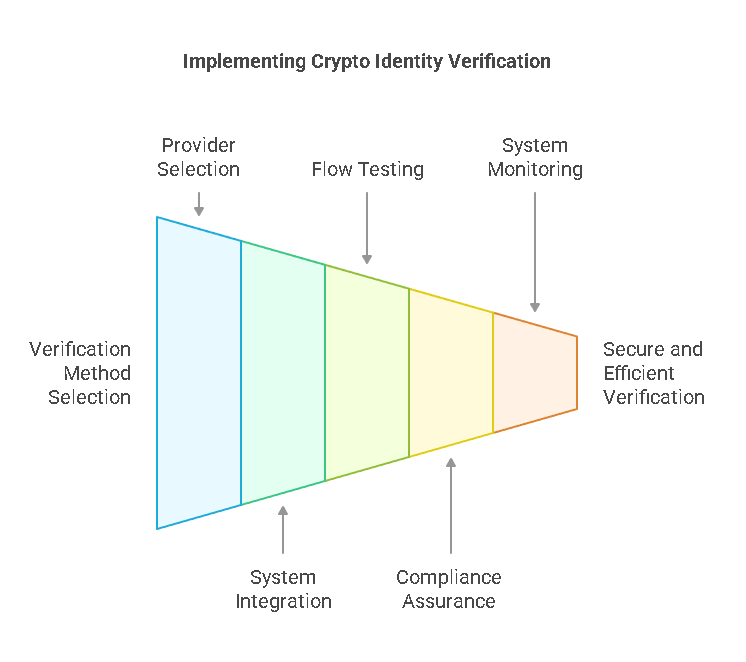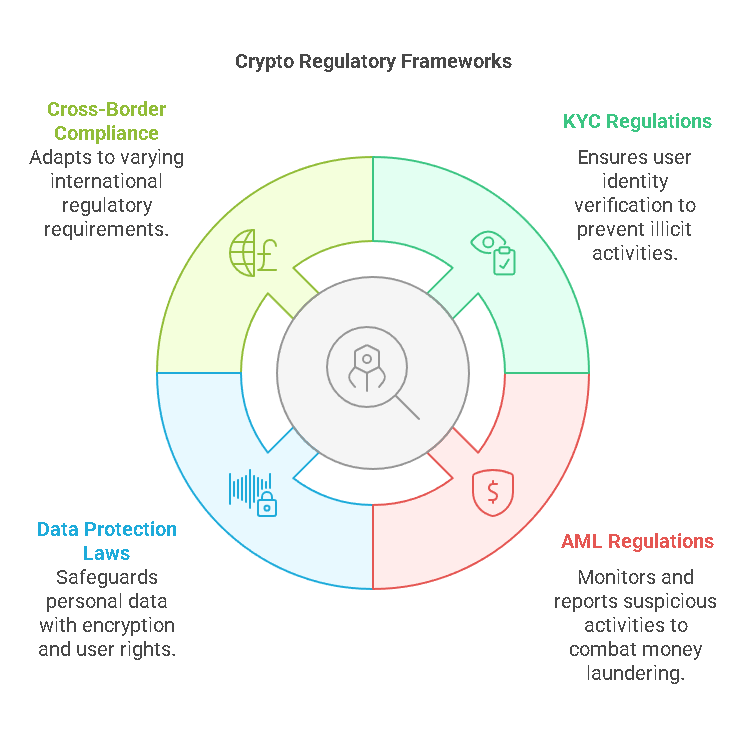Understanding Crypto Identity Verification: Ensuring Security and Compliance in the Digital Age

What is Crypto Identity Verification and Why is It Important?
Crypto identity verification is the process of confirming a user’s identity before allowing access to cryptocurrency platforms or transactions. This verification ensures that individuals participating in cryptocurrency exchanges, wallet services, or decentralized applications (dApps) are genuine users. It plays a pivotal role in preventing unauthorized access, fraud, and compliance violations in the rapidly evolving digital currency landscape.
In the cryptocurrency world, where anonymity and decentralization are key features, identity verification serves two primary objectives:
- Security: Ensuring that users’ accounts and assets are protected from cyber threats.
- Regulatory Compliance: Adhering to global laws and standards, such as Know Your Customer (KYC) and Anti-Money Laundering (AML) requirements, to reduce illicit financial activities.
Why Crypto Identity Verification is Critical

The importance of identity verification in cryptocurrency lies in its ability to counteract the risks associated with decentralized digital transactions. As cryptocurrencies become mainstream, bad actors also exploit their anonymity to conduct fraud, money laundering, and other illegal activities.
Key reasons crypto identity verification is indispensable:
- Preventing Fraud: Identity verification mitigates the risk of fraudulent transactions and account takeovers by authenticating users.
- Regulatory Compliance: Governments and regulatory bodies worldwide are enforcing stricter KYC and AML requirements for crypto platforms to combat illegal activities.
- Building User Trust: When users see that a platform values security and complies with regulations, they are more likely to trust and use its services.
Methods of Crypto Identity Verification
Crypto platforms use various methods to verify identities, each leveraging modern technologies for accuracy and efficiency:
- Document Verification:
- Users upload government-issued IDs (e.g., passports, driver’s licenses) for authentication.
- Advanced systems extract and validate data using optical character recognition (OCR).
- Biometric Verification:
- Involves matching a user’s facial image, fingerprint, or voice with their registered details.
- Facial recognition is popular for its speed and high accuracy in real-time verification.
- Two-Factor Authentication (2FA):
- Combines a user’s password with a secondary form of verification, like a one-time password (OTP) sent to their phone or email.
- Database Cross-Checks:
- Platforms compare user-provided details with trusted third-party databases to confirm authenticity.
These methods often work in tandem, creating a multi-layered security framework that enhances the reliability of the verification process.
Benefits of Crypto Identity Verification for Exchanges and Platforms
For crypto exchanges and platforms, implementing identity verification isn’t just about compliance—it’s a strategic advantage. Here’s how:
- Legal Compliance: Adhering to global KYC and AML standards helps platforms avoid fines and legal complications.
- Enhanced Security: Identity verification acts as a strong defense against fraud, hacking, and other cybersecurity threats.
- Fraud Prevention: By validating user identities, platforms can proactively detect and block suspicious activities.
- Streamlined Onboarding: Modern verification tools make the onboarding process quick and seamless for users, boosting satisfaction and retention.
With robust identity verification in place, crypto businesses not only ensure operational integrity but also foster a safer environment for all participants.
Crypto identity verification is the foundation of trust and security in the cryptocurrency ecosystem. It enables businesses to operate responsibly while offering users peace of mind in their transactions.
How to Implement Crypto Identity Verification for Your Platform
Steps for Implementing Crypto Identity Verification

Integrating crypto identity verification into your platform involves a multi-step process to ensure that the verification system is both secure and efficient. Here is a step-by-step guide for implementing crypto identity verification:
- Determine the Required Verification Methods
Start by selecting the types of identity verification that best suit your platform’s needs. This could include document verification, biometric checks, two-factor authentication (2FA), or database cross-checks. The level of verification needed often depends on the regulatory requirements of your region, the type of services your platform offers, and your user base. - Choose an Identity Verification Provider
Once you’ve decided on the verification methods, the next step is to select a reliable provider. Look for a provider with robust security features, high accuracy, compliance with local and international regulations (KYC/AML), and the ability to scale with your business. - Integrate the Verification System
Integrating an identity verification solution typically involves:- API Integration: Most identity verification providers offer APIs that allow seamless integration into your platform. This process involves setting up API calls to verify user information in real-time.
- Frontend and Backend Setup: Ensure that the verification interface is user-friendly, with clear instructions for uploading documents or completing biometric checks. On the backend, set up secure data handling systems to process and store the verification results.
- Test the Verification Flow
Before going live, it’s essential to thoroughly test the verification flow to ensure there are no glitches. This includes testing document upload functions, facial recognition, and 2FA to ensure that all aspects of the verification process work as intended. - Ensure Compliance with Local and International Regulations
Ensure that the implemented system adheres to regulatory requirements such as the General Data Protection Regulation (GDPR) in the EU or the California Consumer Privacy Act (CCPA) in the U.S. Additionally, make sure that your system complies with regional KYC and AML regulations to avoid potential legal issues. - Monitor and Update the System Regularly
As identity fraud tactics evolve, it’s crucial to regularly monitor and update your identity verification system. This may involve adding new verification methods, enhancing biometric recognition, or improving fraud detection mechanisms.
What to Look for in a Crypto Identity Verification Provider
When selecting a crypto identity verification provider, several factors should be considered to ensure that the solution is reliable, secure, and suitable for your platform’s needs:
- Accuracy and Reliability
Choose a provider with a proven track record in accurate identity verification. High error rates or mismatches could lead to frustration for legitimate users and compromise the platform’s reputation. - Security Features
Data security is paramount when handling sensitive information like personal identification documents and biometric data. Ensure that the provider employs state-of-the-art encryption protocols (e.g., AES-256 encryption) and has secure data storage practices to prevent data breaches. - Speed and Efficiency
Fast verification processes are essential for user experience. Look for a provider that can offer near-instant verification or minimal delays while ensuring high levels of accuracy. - Regulatory Compliance
The provider should meet all regulatory standards, including KYC, AML, and GDPR compliance. This ensures that your platform can operate legally across different jurisdictions. - Customer Support
Reliable customer support is essential for addressing technical issues or user queries quickly. A good provider should offer 24/7 support, preferably with a dedicated account manager. - Scalability
As your crypto platform grows, you need a verification solution that can scale with your business. Look for a provider that offers flexible solutions capable of handling increasing numbers of users without sacrificing performance.
Precisehire’s Crypto Identity Verification Solutions
Precisehire provides comprehensive background screening and identity verification services, including solutions tailored to the crypto industry. By utilizing advanced technologies such as facial recognition, document verification, and real-time database checks, Precisehire ensures that businesses can verify the identities of their users quickly and securely.
Key Benefits of Using Precisehire for Crypto Identity Verification:
- Comprehensive Services: Precisehire offers a range of verification tools, from biometric authentication to address verification, to meet diverse needs in the crypto space.
- Compliance Assurance: The platform ensures full compliance with international regulations like KYC and AML, safeguarding your platform against legal risks.
- Fast Integration: Precisehire offers an easy-to-integrate API, allowing businesses to add crypto identity verification without disrupting their existing workflows.
- Scalability: Whether you’re a startup or an established player, Precisehire’s solutions can scale as your business grows, supporting both small and large volumes of verification requests.
Data Table: Comparison of Crypto Identity Verification Solutions
Below is a comparison table of some leading crypto identity verification solutions to help businesses choose the right provider for their needs:
| Provider Name | Verification Methods | Compliance Features | Integration Ease | Pricing | Support Options |
|---|---|---|---|---|---|
| Precisehire | Document Verification, Facial Recognition, 2FA | KYC, AML, GDPR, CCPA | Easy API Integration | Custom Pricing | 24/7 Support, Account Manager |
| Jumio | Document Verification, Facial Recognition, 2FA | KYC, AML, GDPR, CCPA | API and SDK Integration | Subscription | 24/7 Support, Email Support |
| Onfido | Document Verification, Biometric Verification | KYC, AML, GDPR, CCPA | Simple API Integration | Subscription | 24/7 Support, Chat Support |
| IDnow | Document Verification, Video Identification | KYC, AML, GDPR, CCPA | Seamless API Integration | Pay-Per-Use | Email, Phone Support |
| Civic | Biometric Verification, Document Verification | KYC, AML, GDPR | Easy API Integration | Custom Pricing | Email Support |
Crypto identity verification is essential for ensuring secure transactions and compliance with legal regulations in the crypto space. By choosing the right tools and providers, platforms can ensure they meet user expectations for security and privacy while complying with the necessary legal requirements.

